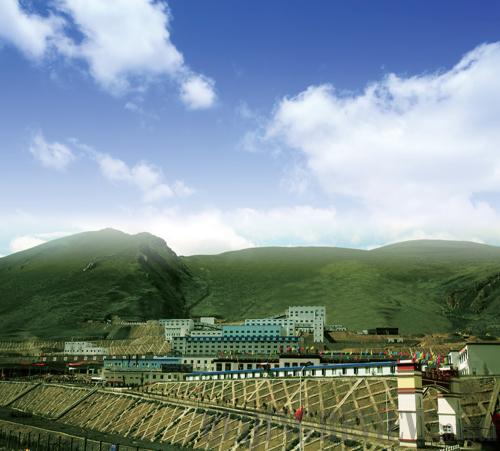|
 |
|
A GREEN MINE: A view of the mining operation area of Huatailong's copper-polymetallic mine in Gyama. The company has spent an aggregate 180 million yuan ($28.48 million) on environmental protection (COURTESY OF CHINA GOLD) |
Local Tibetan people have also seen their lives improved since the arrival of Huatailong.
Ngawang Tsering, 59, an entrance guard at the mine, used to live a nomadic life with his family, the seven members of whom earned only 20,000 yuan ($3,164.56) annually. Now he alone earns 2,000 yuan ($316.46) each month. His son brings in an additional 5,000 yuan ($791.14) a month as a truck driver for the company. With the added income, the family has bought a new car and a house in Lhasa, the regional capital.
However, local people were initially hesitant to cooperate with Huatailong's mining project. The prospect that the mining operations would bring renewed wealth to the region piqued the locals' interest, but the roar of the heavy machinery only proved to raise doubts. Moreover, memories of previous miners who had left their land barren were still fresh on their minds.
Lukhang Yeshe, a 29-year-old Tibetan from southwest China's Yunnan Province, is now the company's assistant general manager. In 2008, when he started working for Huatailong, he served as an interpreter between Tibetans and the company's staff.
"I was called a 'traitor' by the villagers because I helped people from the inland," he said.
Huatailong took various steps to achieve a rapport between the company and the local people. It started by paying 30.87 million yuan ($4.88 million) of cultivated land compensation and 1.93 million yuan ($305,380) of grassland compensation, which had been defaulted by previous miners. The company also paid 3.5 million yuan ($553,797) to compensate the locals for the livestock that died from pollution.
To fulfill its social responsibility, Huatailong has spent more than 120 million yuan ($18.99 million) on road construction, afforestation and poverty aid.
The company also donated 740,000 yuan ($117,089) to local poor families, financed nine Tibetan students to study in Northeastern University, sent 30 Tibetan staff members to the inland for professional training and donated 550,000 yuan ($87,025) to local students.
To improve local employment and increase the income of local residents, Huatailong hired 253 local Tibetans. To date, there are 294 employees from minority ethnic groups, accounting for 35 percent of the company's total staff, and their per-capita average annual income has reached 45,000 yuan ($7,120.25). In comparison, according to figures from the Bureau of Statistics of the Tibet Autonomous Region, in 2011 the per-capita net income of local farmers and herdsmen was only 4,904 yuan ($775.95).
In December 2009, Huatailong invested 16 million yuan ($2.53 million) in purchasing the transport team of Gyama Town and establishing the Gyama Industrial and Trading Co., with all the 3,850 local residents of 655 families as shareholders. By now the company has granted them 2.51 million yuan ($397,152) in total bonus revenue.
Almost all the managers, drivers and staff members in the trading company are local Tibetans, with an average salary of 4,000 yuan ($632.91) a month. Lukhang Yeshe said many of them have bought their own cars.
Tsering Dekyi, 24, is among the nine students sent to Northeastern University by Huatailong. Previously, she had studied in a university for a semester before her family met with trouble supporting her education.
She later heard that Huatailong would send Tibetan students to study in Northeastern University. She applied to the program and was accepted, majoring in mining engineering. After graduating in 2010, she joined Huatailong, now earning 5,000 yuan ($791.14) a month.
Huatailong also hires local Tibetans to do the planting work, paying each 50-70 yuan ($7.91-11.08) a day. From April to September, the company can offer 60 to 80 such job opportunities.
Taxes paid by Huatailong have greatly improved the financial status of the local government. "Metrorkongka used to be a poverty-stricken county, but after Huatailong integrated the local mining industry, the mining industry has become a pillar industry for Metrorkongka," said Lin Tao, the county Party secretary.
According to figures from Huatailong, in 2011 the company paid 118 million yuan ($18.67 million) in taxes, accounting for 47 percent of the county's total tax revenue.
Lukhang Yeshe has felt closely connected to Huatailong. "If it weren't for Huatailong, our lives wouldn't be this good," he told Beijing Review.
Email us at: wangjun@bjreview.com | 